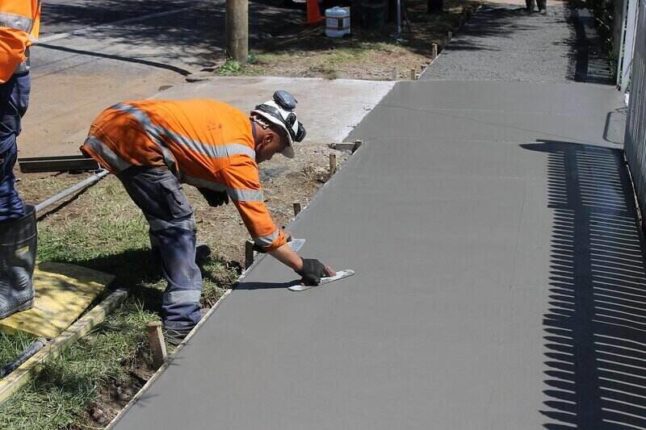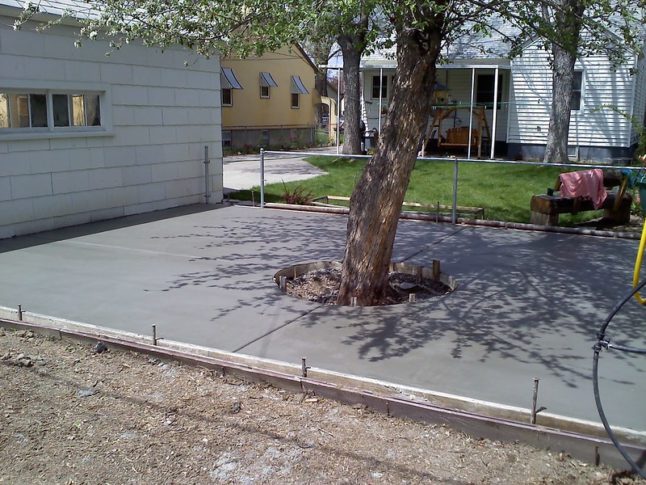On average, a concrete sidewalk can cost $8.63 per square foot to install, with a typical range between $5.89 and $12 per square foot.
Many factors affect total project costs, including the concrete’s thickness, the sidewalk’s shape, and the type of finish. Sidewalks can range from a simple concrete slab to an elaborate hardscape with attractive features.
Want to accentuate your new concrete sidewalk with flower beds or outdoor landscape lighting? Projects like these are an additional cost, and we will cover those, too, in our concrete sidewalk pricing guide.
Table of Contents
How Much Does a Concrete Sidewalk Cost?
Most homeowners pay $8.63 per square foot for concrete sidewalk installation. But not every concrete sidewalk is the same. Prices typically range between $5.89 and $12 per square foot, depending on the details of the projects.
Read: What is the cost for concrete removal?
In some cases, your sidewalk might fall below or above the typical range. Several facets can impact total costs, such as the sidewalk’s size, its grade of concrete, and whether it’s reinforced.
Cost Estimator by Size

Most concrete professionals charge by the square foot to account for material costs and labor. The greater your sidewalk’s square footage, the more your project will cost.
Find out: What is the price for concrete per yard?
On average, most concrete sidewalk installations cost between $5.89 and $12 per square foot.
| SIZE (sq ft) | AVERAGE COST ($8.63 Per sq ft) | TYPICAL RANGE ($5.89 to $12 Per sq ft) |
| 50 | $431.50 | $294.50 to $600 |
| 100 | $863 | $589 to $1,200 |
| 200 | $1,726 | $1,178 to $2,400 |
| 300 | $2,589 | $1,767 to $3,600 |
| 400 | $3,452 | $2,356 to $4,800 |
Other Factors That Affect Cost
Your sidewalk’s size plays a significant role in your total bill, but it’s not the only item affecting costs. The sidewalk’s thickness, shape, and grade of concrete will also impact the bill.
Read: How much does stamped concrete cost?
- Thickness: The thicker the sidewalk, the more you’ll need to pay for materials and labor.
- Shape: A straight-edged sidewalk is a straightforward project, but a sidewalk with twists and turns requires more labor.
- Type of Finish: Stamping your concrete or giving it a polished finish will pull more from your wallet.
- Grade of Concrete: Some concrete mixtures are stronger and more durable than others, resulting in higher costs.
- Land Preparation: You must install your sidewalk on flat land. If the terrain is sloped or bumpy, you’ll need to pay extra for land preparation.
- Accessibility: If the site is difficult to access, installers are likely to increase their labor rates.
- Reinforcements: Reinforcing a concrete sidewalk with rebar or wire mesh will cost you extra.
- Concrete Removal: Have an existing sidewalk you want to replace? You’ll need to remove any existing concrete before pouring new concrete.
Thickness
Concrete’s thickness helps to increase its strength. The ideal thickness for a concrete sidewalk is 4 inches. You’ll need to pay for extra materials and labor if you want to increase the sidewalk’s thickness.
Shape
A sidewalk with multiple curves can be more challenging to install than a sidewalk with straight edges, resulting in higher labor costs. The challenge is in building a curved frame that captures the sidewalk’s desired shape.
Type of Finish
If you want your sidewalk to have an attractive color or shine, then you’ll need to pay extra for the finishing touch. Concrete finishes include:
- Polished: A pro grinds the concrete to eliminate imperfections and create a striking sheen. Polishing concrete can cost anywhere between $3 and $30 per square foot, depending on the concrete’s blemishes and the desired luster.
- Stained Concrete: Staining allows you to change concrete’s color. It costs between $3.40 and $25 per square foot to stain concrete.
- Stamped Concrete: Stamping concrete occurs when the concrete is still wet from a pour. Stamped concrete, which often mimics the appearance of cobblestone or pavers, typically costs between $9 and $25.25 per square foot for the concrete and the stamping.
- Epoxy: Epoxy sealer creates an abrasive-resistant coating to help prevent cracks and damage in the concrete. A pro will typically charge between $4.75 and $10.25 per square foot to apply epoxy.
Grade of Concrete

Concrete is a mixture of sand, cement, water, and loose aggregates. Mixtures with different ingredient ratios will produce concrete with varying degrees of strength.
Concrete grades are determined by the concrete’s minimum strength (measured in newtons) 28 days after setting. Grades help pros and DIYers identify the best concrete composition for their project.
Remember, strength varies among different grades of concrete. The more durable the concrete grade, the more you can expect to pay.
Land Preparation
It costs between $5.89 and $12 per square foot to install a concrete sidewalk. This range does not include land preparation.
A sidewalk must be installed on level terrain. If the project site is sloped or uneven, you’ll need to hire a pro to grade and reslope the land. On average, land grading costs between $1 and $10 per square foot.
Accessibility
If you want to pour your sidewalk’s concrete in a hard-to-reach area, you’ll likely need to pay more in labor costs. Pros may need to transport the concrete using wheelbarrows or use a pump truck that pumps the concrete to the site. Anything that makes the job more difficult will impact labor, and that includes site accessibility.
Reinforcements
Most sidewalks are not reinforced with rebar or wire mesh. These reinforcements are often installed in concrete slabs that will endure heavy use, like a concrete driveway.
Reinforcements help increase the concrete’s strength and durability. Reinforced concrete often requires fewer repairs than concrete without rebar or wire mesh.
If you choose to have rebar or wire mesh in your sidewalk, expect to pay an additional $0.35 per square foot.
Concrete Removal
If there is concrete at the site where you wish to pour a new sidewalk, you’ll need to remove the existing concrete. Most homeowners pay between $2 and $6 per square foot for concrete removal.
Extra Services
Want to make your new concrete walkway shine in the landscape? Decorative mulch and flower beds will give it a charming appeal, and outdoor landscape lighting can accentuate its details at night.
We’ve gathered a few outdoor projects (and their average costs) that might boost your sidewalk’s curb appeal:
- Landscaping: Increase your sidewalk’s beauty with surrounding colors and textures.
- Retaining Wall: Adding a retaining wall alongside your sidewalk is an eye-catching hardscape project ideal for sloped terrain.
- Concrete Patio: Connect your concrete sidewalk to a concrete patio.
- Landscape Lighting: Outdoor lighting allows you to safely walk along your sidewalk at night.
Landscaping
Transform your simple concrete sidewalk into an elegant pathway with landscaping. The possibilities are endless when it comes to decorating your sidewalk’s borders. Get creative with border ideas like river rock, boxwoods, textured mulches, and flower beds.
Professional flower bed installation costs most homeowners between $650 and $3,000, depending on the project’s scope. Mulching typically costs between $37 to $113 per cubic yard for the mulch and the professional installation.
Retaining Wall
Retaining walls add many benefits to the landscape, and they can look beautiful along a sidewalk. These hardscape features help stabilize sloped land, prevent flooding, and limit erosion. Retaining wall installation often ranges between $4,025 and $8,711.
Concrete Patio

A concrete sidewalk can transition seamlessly into a concrete patio. Patios bring fun and entertainment to the backyard, creating an excellent area for an outdoor living space, hot tub, or fire pit. It costs between $4.40 and $16 per square foot to pour a concrete patio.
Landscape Lighting
If your sidewalk is polished or stamped, landscape lights can accentuate these details at night. Your walkway’s charm needn’t disappear once the sun goes down.
Landscape lighting also increases safety. When walking outside at night, landscape lighting allows you to watch your step or spot any wandering animals.
On average, professional installation costs $188 to $325 per light. This cost includes labor and the light itself.
Cost of Concrete Sidewalks Across the U.S.
All prices listed in this cost guide are national averages. Depending on where you live, prices may vary due to accessibility to concrete and how far delivery trucks must drive. This pricing guide is a helpful tool for calculating average cost estimates, but prices may vary on a local scale.
DIY Concrete Sidewalk
Pouring concrete can be a difficult DIY project if you’re unfamiliar with the material. Pouring a sidewalk is a labor-intensive job, and it requires good timing.
Attempting to install concrete yourself without the proper planning or execution could lead to costly mistakes or injuries. Hiring a professional might take a bite from your wallet, but DIY mistakes could cost even more to repair.
If you’re on the fence about pouring concrete on your own, here’s what you can expect from the home improvement project:
- Find a location for your sidewalk.
- Clear the land where you wish to install your sidewalk. Remove grass, shrubs, rocks, bushes, and even old concrete until the soil is exposed.
- Tamp the soil. The soil acts as the concrete’s subgrade. If the soil is not compact and tamped, it will shift beneath the concrete and compromise the sidewalk’s structure and strength.
- Apply and tamp the subbase, which is the layer above the soil subgrade. Gravel is a common subbase material.
- Install a sturdy wooden frame that outlines your sidewalk’s shape. The frame is an enclosure in which you’ll pour your concrete.
- Install the wire mesh or rebar. This step is optional, as not all sidewalks require reinforcements.
- Mix your concrete composition using a concrete mixer or a wheelbarrow and shovel. You’ll need to wear a mask, safety glasses, rubber gloves and boots, pants, and a long-sleeve shirt.
- Pour the concrete inside the wooden frame and spread the mixture around with shovels and rakes.
- Level and smooth out the wet concrete with a screeding tool.
- Run a bull float across the concrete’s surface. A bull float allows the aggregate-free cream to rise to the surface and sends the floating aggregates down.
- Edge the sides of the concrete with a concrete edger. The edger makes the sides more precise and less susceptible to cracking.
- Make joints every 5 to 6 feet with a groover. This step helps to prevent the concrete from cracking.
- Sweep the concrete slab’s surface with a broom to create traction. Otherwise, the surface might be slippery.
- Apply a concrete sealer to help the concrete cure.
Need a visual DIY guide? This instructional video by MARSHALLTOWN offers detailed instructions on how to pour concrete:
FAQ About Concrete Sidewalks
1. How do I maintain my concrete sidewalk?
Concrete can last for decades if it’s properly maintained. Here are some tips to keeping your concrete sidewalk clean and in good condition:
— Pressure wash the concrete to remove grime and mildew from its surface. Avoid pressure washing near cracks; otherwise, you risk damaging the concrete further.
— Remove surrounding weeds with an edger.
— Repair cracks as soon as they appear.
— Do not apply more weight than your concrete can handle. For example, do not park your car on a concrete sidewalk.
— Apply a sealant to your concrete to help protect it from damage and stains.
2. Who is responsible for the concrete sidewalk adjacent to my property?
Most cities and local governments make homeowners responsible for maintaining, repairing, and replacing the concrete sidewalks adjoining their homes.
3. How much does concrete cost per cubic yard?
Concrete costs an average of $117 per cubic yard, with a typical range between $104 and $144 per cubic yard.
Conclusion
A concrete sidewalk in the yard provides a safe path of travel and helps keep foot traffic away from your flowers and turf. Hire a pro to pour your concrete walkway for you or turn it into a DIY project if you’re familiar with concrete.
Need help installing flower beds or a retaining wall around your concrete sidewalk? A local landscaping professional can take the job off your hands.
Installing a concrete sidewalk ranges between $5.89 and $12 per square foot and has an average cost of $8.63 per square foot. Overall costs will vary depending on various project details, including the concrete’s finish type, grade, and thickness.

